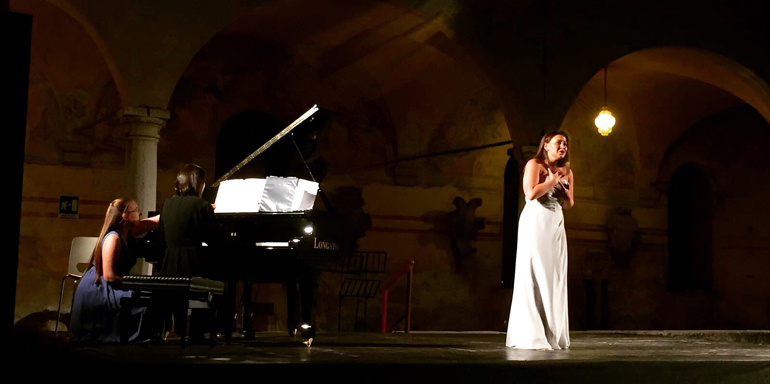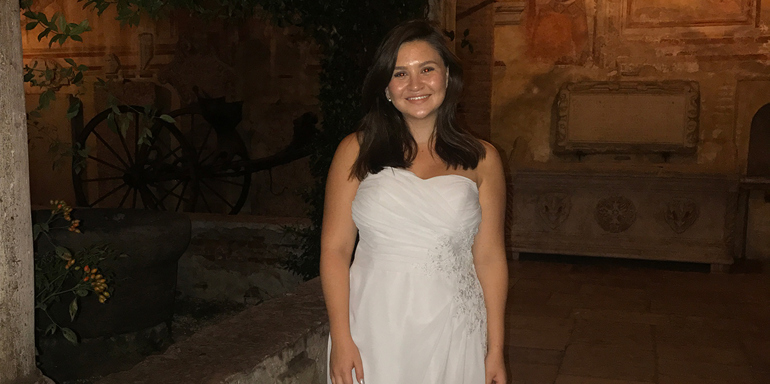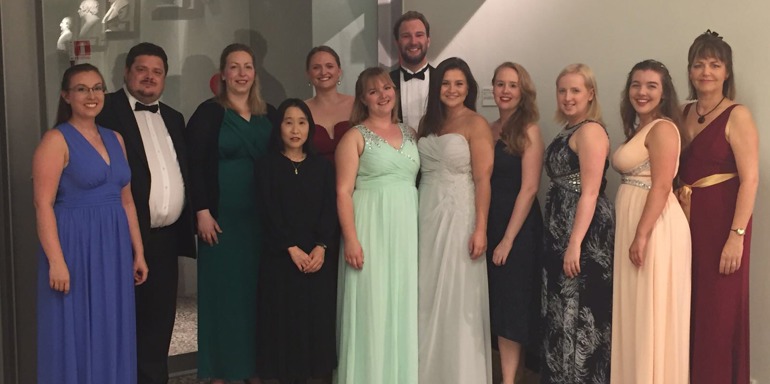In the first instalment of our ‘Careers in Music’ series, we caught up with Lily Scott to get her top tips for a career in Classical Music….

Lily Scott
Lily Scott is an LCoM alumna in Classical Music. Since graduating two years ago, she has been building a successful career in the music industry. A Classical vocalist by trade, she now runs two businesses alongside keeping up with high profile performances. She has performed with the likes of Fulham Opera and the Young Artist Platform and has most recently completed a stint at the prestigious Veneto Operaestate Festival in Italy.
In the first instalment of our ‘Careers in Music’ series, we catch up with Lily to get her top tips for a career in Classical Music….
How has your career developed in the last two years since leaving Leeds College of Music?
After graduating from LCoM, I studied MMus Musicology at King’s College London. Alongside this, I was fortunate enough to get straight into professional singing work, most notably playing the role of Giselle in the UK premiere of “The Doll Behind the Curtain” at the Tête à Tête Opera Festival, London.
Since then, I have set up two of my own businesses. One involves music and dance for weddings and the other is a summer school workshop series, focusing on devising theatre and musical composition for children and young people. Recently I was part of the Music Facilitation Workshop Course in collaboration with the Learning Departments of the Royal Opera and English National Opera.
How was your experience at Veneto Operaestate Festival and how did this opportunity come about?
Singing at the Operestate Festival in Bassano del Grappa, Italy with Melofonetica was an amazing experience, I am extremely grateful to have been given the opportunity. Melofonetica is a London based Academy that teaches the science and art of sung Italian through a new method of “melophonetics”.
I discovered the opportunity through one of my singing coaches, applied for the course, and was lucky enough to be accepted! The course was series of intensive language and singing coaching given by a world-class team of teachers and coaches culminating in concerts at the end of the week. It completely changed the way I approach learning music and text - and sung Italian! I now incorporate The Melofonetica Method into my technique and I won’t look back. The main thing I learned is that as singers, we never stop learning!

Do you have a portfolio approach to your career?
Yes - I’m a singer, workshop leader/animateur, singing tutor and musicologist (studying Jazz in Hollywood and Broadway since 1926). I also have lots of experience in arts administration.
I am based in London, where there is a plethora of incredibly talented musicians, so it is important to carve out a unique career for myself. I’m still young and very much a small fish in a big pond. However, I’m committed to making sure that I am always working to a very high standard, yet always learning and improving my skills.
How have you approached promoting yourself as a Classical Musician and what advice would you give to others developing a career in this area of the music industry?
I actually need to get a lot better with self-promotion social media! I do have social media accounts across the major platforms, but I tend to invest more time into going to watch opera, going to concerts and gigs (especially at Ronnie Scotts!) and going to the theatre most nights of the week, spending time in the bar afterwards networking!
I know it sounds a bit cliche, but I honestly think that talking to people and having face-to-face conversations is more memorable than a post on Twitter. That’s in no way to downplay the effectiveness of social media as a marketing and promotional tool - it can be great! For me right now, it’s more about creating and developing working relationships with people in not just the classical, but the jazz and theatre spheres, too.
Do you find that it is necessary to have a flexible approach to your career in order to have a variety of income streams?
Absolutely. It’s important to make sure that you take jobs which are credible, which will enhance your profile and develop your professional and musical skills. However, being too picky about taking work isn’t a good idea, as you never know who you might meet on jobs!
I’ve embarked on my business ventures obviously because I’m incredibly passionate about both of them and I like having creative control. I really enjoy working for myself with a small, close team of amazing people too!
What has been the highlight of your career since leaving LCoM?
Singing at the Operaestate Festival Veneto and being appointed Director of Partnerships for Fulham Opera, and being able to grow with them as a Young Artist Soprano.

What challenges have you faced since leaving the conservatoire and how have you adapted to overcome these?
Auditions have been the most challenging. It’s important to look at auditions as an opportunity to showcase your talent to a team of supportive creatives, rather than a painful 15 minutes of being judged and critiqued by an intimidating panel. However, there is no denying that they are unnatural and nerve-wracking situations!
The more auditions I have done, the more I’ve improved my audition technique and have had a number of successful outcomes which has been encouraging. I also swear by an unfailingly positive attitude and calm approach - it’s just an audition, not the end of the universe!
Do you have any advice for other musicians embarking upon a career in Classical Music?
Be yourself. Be excellent at networking, show up exactly on time to everything, learn all your music before all rehearsals and keep having regular singing or instrumental lessons. Be a genuine person that people respect and like working with - you won’t get far if you aren’t.
I also live by what I call the “Five Minute Rule.” If a situation won’t affect you in five years, only give yourself five minutes to rant/vent/complain/cry before moving on. Most importantly, never, ever, ever give up! If the idea of something seems impossible, it’s probably the exact thing that you should be pursuing.






